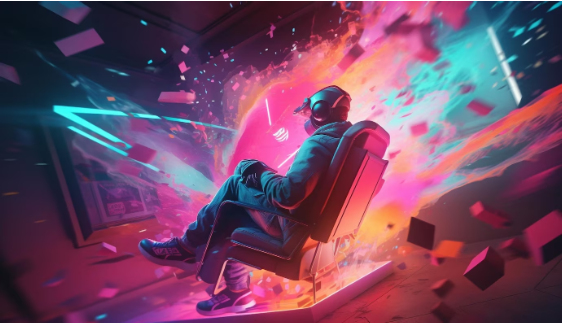In the vast landscape of human experiences, the realm of gaming has emerged as a dynamic and captivating domain. Beyond mere entertainment, gaming has become a portal to alternate realities, offering players the chance to embark on virtual adventures that stimulate both the mind and the senses. Delving into the intricate tapestry of the gamer’s brain, we uncover a fascinating interplay of neuroscience and virtual exploration that goes far beyond the simple push of buttons.

The Dopamine Rush: Gaming as a Reward System
One of the primary neurotransmitters at play in the gamer’s brain is dopamine. This chemical messenger is associated with pleasure and reward, and its release is heightened during gaming experiences. The anticipation of victory, the accomplishment of completing a challenging level, or the acquisition of in-game rewards triggers a surge of dopamine, creating a sense of satisfaction and reinforcing the player’s engagement with the virtual world.
Neuroscientists have compared this phenomenon to the reward system activated by addictive substances, highlighting the potential for gaming at truliitalian.com to become habit-forming. However, it’s important to note that the majority of gamers maintain a healthy relationship with their virtual adventures, using them as a source of entertainment and stress relief rather than succumbing to addiction.
Cognitive Flexibility: Navigating Complex Virtual Worlds
Gaming often requires players to navigate intricate and multifaceted virtual environments, fostering cognitive flexibility. This cognitive ability allows individuals to adapt to changing circumstances, think creatively, and switch between different tasks seamlessly. In the context of gaming, cognitive flexibility is exercised when players must solve puzzles, strategize in real time, and make split-second decisions.
Researchers have found that regular engagement in video games can enhance cognitive flexibility, leading to potential benefits in real-world scenarios. The ability to process information rapidly and adjust strategies on the fly can prove advantageous in various aspects of life, from problem-solving at work to managing everyday challenges.
Neuroplasticity: Rewiring the Brain Through Gaming
The concept of neuroplasticity, the brain’s ability to reorganize and adapt by forming new neural connections, is a central theme in the discussion of the gamer’s brain. Continuous exposure to the challenges presented in virtual environments stimulates neuroplasticity, shaping the brain’s structure and function.
Studies have shown that action video games, in particular, can lead to improvements in visual attention and spatial cognition. Gamers often develop heightened awareness, improved hand-eye coordination, and enhanced reaction times. These cognitive enhancements not only contribute to gaming proficiency but can also have positive implications for skills utilized in non-gaming contexts.
Social Connectivity: The Multiplayer Dimension
Modern gaming has evolved beyond a solitary pursuit, with the advent of online multiplayer modes connecting gamers from around the globe. This social dimension adds another layer to the neuroscience of gaming. Interacting with others in a virtual space stimulates areas of the brain associated with social connection and communication.
The camaraderie formed during cooperative missions or the competitive spirit invoked in multiplayer competitions can trigger the release of oxytocin, often referred to as the “love hormone.” This hormone is linked to social bonding and trust, highlighting the potential for gaming to foster meaningful connections between individuals separated by physical distances.
The Dark Side: Addressing Concerns and Misconceptions
While the positive aspects of gaming on the brain are noteworthy, it’s crucial to acknowledge and address concerns associated with excessive or problematic gaming. Some individuals may experience negative effects, such as sleep disturbances, impaired academic or occupational performance, or social withdrawal.
It’s important to approach gaming with moderation and awareness. Understanding individual limits and recognizing when gaming habits become detrimental is key to maintaining a healthy balance between virtual adventures and real-life responsibilities.
Also Read
- Soul Knight Prequel Gift Codes
- How to fix the Privacy Configuration Resolution Failed Soul Knight?
- How to Fix Soul Knight Prequel Connection Error?
- Soul Knight Prequel Server Status
Conclusion:
The gamer’s brain is a fascinating terrain where neuroscience and virtual adventures intersect. From the release of dopamine during moments of triumph to the reshaping of neural connections through neuroplasticity, gaming has profound effects on cognitive processes. As we continue to unlock the mysteries of the gamer’s brain, it’s essential to approach gaming with mindfulness, embracing its positive potential while remaining vigilant to the pitfalls that may arise. In the vast landscape of virtual adventures, the journey through the gamer’s brain is an ongoing exploration, promising new insights and discoveries on the horizon.

